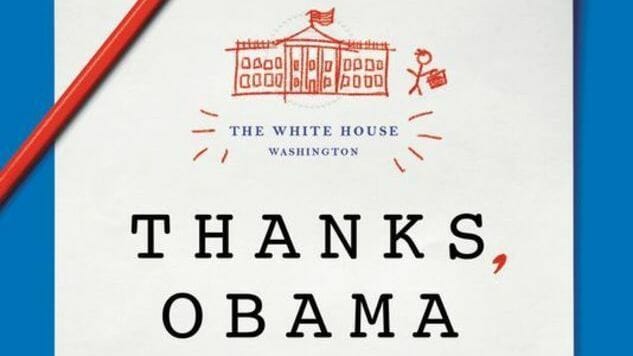An Obama Speechwriter’s Memoir Highlights the Power of Presidential Words
Books Features Barack Obama
Surely, you’ve heard Donald Trump speak.
Make no mistake, Trump is a great orator, in the same way a tsunami is a great wave or Jim Jones was a great preacher; indeed, while the President seems to have a distressingly weak grasp of the English language, his ability to stand before a bully-pit and make a broiler chicken look like Chanticleer is his greatest strength. Tact and politic count for very little when one is speaking to their own side, and only motivation—simple, pure motivation—is necessary for an election win. The stump is the only place Donald shows any efficacy at all.
He does this via shock and awe, brute force and braggadocio, channeling every Wall Street wolf and old school football coach who came before him. He speaks in centipede sutures and staples, exclamations and catechisms field trauma care for the gaping wounds where his thoughts have been punctured or sloughed away. He breaks, plods, stutters, roars, a dog whistle the only sounds cutting through the cacophony, his cadence ambling like a skull rolling downhill and thoughts left dangling from the gallows, the familiar, wayfaring elements of the English language made alien, frightening by their appearance and affect, their design—truly, their lack thereof—and delivery, rhetoric as re-animated cat skeleton.
 It’s bittersweet, then, that Obama speechwriter David Litt has released his memoir, Thanks Obama: My Hopey, Changey White House Years, in the opening stages—dear God, the opening stages!—of the least eloquent Presidential term in American history. And while the memoir is full of lighthearted asides, Obama grace notes, and earnest appeals to the better essence of politics—and enhanced with Litt’s sense of humor—it also highlights the power of presidential rhetoric, via the stark differences between how it is used now versus in the Obama administration.
It’s bittersweet, then, that Obama speechwriter David Litt has released his memoir, Thanks Obama: My Hopey, Changey White House Years, in the opening stages—dear God, the opening stages!—of the least eloquent Presidential term in American history. And while the memoir is full of lighthearted asides, Obama grace notes, and earnest appeals to the better essence of politics—and enhanced with Litt’s sense of humor—it also highlights the power of presidential rhetoric, via the stark differences between how it is used now versus in the Obama administration.
Litt served a President who had little choice but to use his own gift for speaking to unify a divided country, a burden placed upon him by a partisan republic, an albatross of an opposition party, and the very color of his skin. Obama is remembered as a beacon and counselor, a president whose speeches first ran from righteous hope to, in the end, an executive order signing, no-bullshit taking, proud, unafraid, and powerful member of a marginalized group of people. In his recollection of key speeches, Litt provides us with powerful evidence of what a speech can do.
In his speech following the Supreme Court’s legalization of gay marriage, a proud Obama spoke of the slow, painful process of progress, all too rarely “rewarded with justice that arrives like a thunderbolt.” Days later, in Charleston, he addressed the nation after Dylan Roof’s terrorist attack on Mother Emanuel—the eighth mass shooting during the Presient’s time in office.
“The church is and always has been the center of African American life, a place to call our own,” Obama said. Our own. This was the first black president, mourning in front of his nation as a black American.
By peeling back the skin of a speech, Litt demonstrates the complex and bloody physiology of these very living things. He makes clear the hours and days and weeks and months of effort; the brainstorming, drafting, meeting, revising, fact checking—remember facts?—that goes in to a true speech. Litt reveals all the inner workings Trump’s phantom rants lack, the lack of effort that animates them with emotion but robs them of their soul.
What Litt understands and what Thanks, Obama makes clear may very soon be forgotten: The finest presidential speeches can heal the nation. In moments of true desperation, party lines are briefly abandoned and a mournful, hopeful cry is offered up from the wasteland between left and right. Obama had Charleston; Bush the stirring and steely response to 9/11; even Reagan had his Challenger speech, wherein, with help from the poet John Gillespie Magee, Jr., he reminded a heartbroken citizenry and shocked schoolchildren that the explorer’s heroics would never be forgotten, those who “slipped the surly bounds of Earth” to “touch the face of God.”
Trump has had Charlottesville, and he has failed. He has had Harvey, and he has failed. And when the next terrorist strikes, when the next mass shooting happens, he will fail again.
Trump’s speech will be another bayonet through America’s heart.
B. David Zarley is a freelance journalist, essayis, and book/art critic based in Chicago. A former book critic for The Myrtle Beach Sun News, his work can be seen in The Atlantic, Hazlitt, Jezebel, Sports Illustrated, VICE Sports, Creators, Sports on Earth and New American Paintings, among numerous other publications. You can find him on Twitter or at his website.